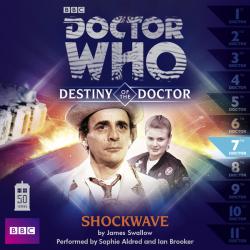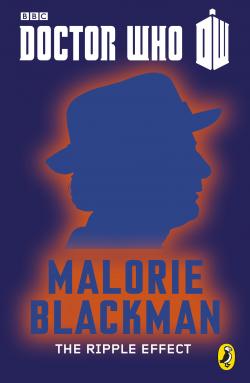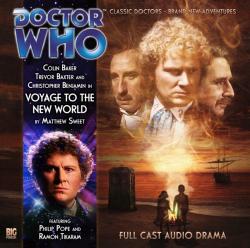Mastermind (Big Finish)
Thursday, 1 August 2013 - Reviewed by
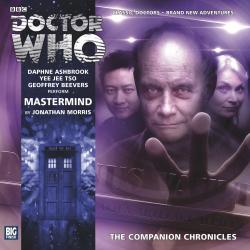
Mastermind
Produced by Big Finish
Written by Jonathan Morris
Directed by Ken Bentley
Released: July 2013
The Master, Mastermind
He had very little screen time in the 1981 Doctor Who story The Keeper of Traken but there is no doubt that it was Geoffrey Beevers’ refined, suave, hypnotic and mischievous voice which gave the villainous Melkur and (in the revelatory moments of that serial) the cadaverous version of the Master such a magnificent screen presence. Beevers’ performance as the Master in that story and to this day drips with undercurrents of malevolence and menace that have been rarely matched by his successors on TV, including Anthony Ainley and John Simm.
Big Finish obviously recognised Beevers’ voice talent because he has been the company’s preferred version of the Master on audio since 2001. He made an astonishing, yet magnificent return as the Master in Dust Breeding, alongside Sylvester McCoy’s Doctor, and more recently rejoined Tom Baker in his first season of Fourth Doctor audio adventures. Beevers’ Master is also the antagonist in Big Finish’s 50th anniversary extravaganza The Light at the End in November. In the meantime, you can enjoy Beevers’ mesmerising version of the Master in the latest (mis-named) Companion Chronicle Mastermind (judging by the way the Master views himself in this story, and the way Morris describes him in the post-story interview, he would be horrified at the second billing as a “companion”!).
Beevers’ propensity for captivation, while a large part of why the story works, is not just confined to his performance. It is inherent in writer Jonathan Morris’ storytelling as well. Through the eyes of the protagonists – UNIT soldiers Captain Ruth Matheson and Warrant Officer Charlie Sato (played by Who veterans Daphne Ashbrook and Yee Jee Tso) – we find ourselves absorbed in the Master’s story as he boasts of his escape from the TARDIS’ Eye of Harmony (after the events of the 1996 TV movie) and his subsequent survival on Earth for over a century. There are particularly effective moments in the story when the listener is as much stirred from the flashbacks as Captain Matheson and Warrant Officer Sato are – such is the power and realism injected into the storytelling by the cast’s performances and the atmospheric incidental music and sound effects (eg the tolling of Big Ben and the screams of a woman effectively underline a horrific murder). Beevers, Ashbrook and Tso all convincingly step into other roles in the course of the Master’s account, whether that be Beevers masquerading as a succession of New York and Las Vegas gangsters (complete with differing American accents), Ashbrook as a waitress-cum-assassin or Tso as many of the Master’s unsuspecting vessels for his nefarious mind.
As with recent Companion Chronicles (such as The Scorchies), Mastermind is told in “real time”, with Matheson and Sato alternating turns in an interrogation with the Master. In scenes which producer David Richardson in the post-story interview likens to Clarice Starling’s memorable interrogation of Hannibal Lecter in The Silence of the Lambs, the hour-long story (much like its titular character) takes on a devious, psychological edge. As it draws towards its conclusion, the tale exposes the vulnerabilities of the protagonists while reinforcing the strengths of the antagonist. You realise at the conclusion that the Master, much like Lecter, has manipulated the proceedings all along.
Daphne Ashbrook and Yee Jee Tso are competent as their characters and you don’t need to have listened to their previous audio outing Tales from the Vault to understand the characters. That said, it is hard to treat Sato seriously when he behaves at the beginning of the story more like an irritating, wet behind the ears fanboy than a supposedly hardened, extremely well trained UNIT officer! Sato’s reaction when he learns the identity of UNIT Prisoner Alpha One is akin to a fanboy who’s just seen his idol at ComicCon and reinforces to the listener that he is going to be no match for the individual that he is about to interrogate: “No way! ... The Master ... a member of the Time Lord race and the Doctor’s greatest enemy! ... Oh, I’m ready! ... An interview with the Master ... Wish me luck!” Obviously UNIT – or at least its US branch - isn’t recruiting very well these days! Matheson at least seems to hold her own in some scenes with the villain but ultimately Tso and Ashbrook were always going to be outshone by Beevers in this narrative.
The cliffhanger twist to Mastermind, while predictable, reinforces the seductive nature of the Master’s voice (which entrances the listener as much as the protagonists). It also underlines why Beevers is the perfect choice for the Master in this medium. It doesn’t matter to this fan that Beevers has played the Master “out of continuity” (eg filling the gaps between Anthony Ainley’s and Eric Roberts’ incarnations, and now Roberts’ and Derek Jacobi’s personifications) because for me, in this format, Beevers is unquestionably the Master. Indeed, this story hints very strongly that the Beevers incarnation is the “core” of the character. As the Master himself says, “I have worn many bodies over the years but always they revert to my true form ... I am the living embodiment of entropy! Rotten to the core!”
My only criticism of this story (and it is a minor gripe) is the references to short stories in Big Finish’s Short Trips collection that are no longer available in the company’s back catalogue! Again, there is no need for casual listeners to have heard Tales from the Vault to know who Matheson and Sato are but the Master’s tale references short stories from the anthology The Centenarian (released way back in September 2006) which are quite important to kicking off the narrative (and which are only available in print). While it is still easy enough to connect the dots and the flow of the story isn’t grossly affected, the reference will be confusing to all but the most rusted-on Big Finish subscriber. It would have been better if the prior short story had been ignored altogether.
But again, don’t let a trivial grumble dissuade you from enjoying this tale. Mastermind is a superb entry in the Companion Chronicles. While it doesn’t necessarily reveal new insights into the Master (indeed, like the Doctor, part of the character’s appeal is his mystery), it is nevertheless a great opportunity for the character – and by extension, Geoffrey Beevers – to be the “hero” in his own story, liberated and unencumbered by the do-gooding and meddlesome Doctor!

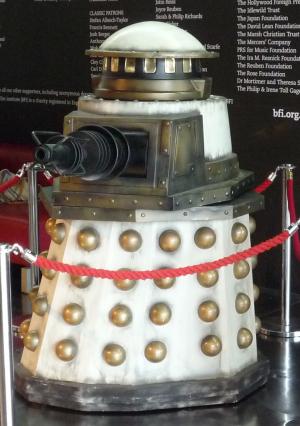 I love
I love  I'd never actually seen an episode of Doctor Who shown on a big screen before, and wasn't sure how well 4:3-framed 625-line video material would hold up under such scrutiny. In fact, it looked very good indeed, perfectly sharp and at such size I found myself noticing little details I hadn't spotted before, such as the graffiti figure on the school gate next to The Girl, as she watches the Doctor and Ace in episode one.
I'd never actually seen an episode of Doctor Who shown on a big screen before, and wasn't sure how well 4:3-framed 625-line video material would hold up under such scrutiny. In fact, it looked very good indeed, perfectly sharp and at such size I found myself noticing little details I hadn't spotted before, such as the graffiti figure on the school gate next to The Girl, as she watches the Doctor and Ace in episode one. There were also interesting little chats with effects designer
There were also interesting little chats with effects designer 